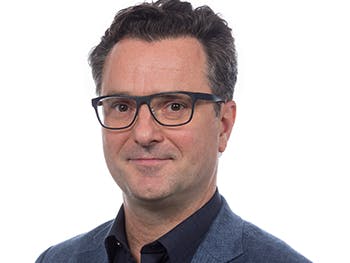UNIVERSITY NEWS LAST UPDATED : 19 FEBRUARY 2019

How does the proliferation of cultural activism affect our understanding of politics, social media, and human rights in a post-digital age? This is one of the key questions posed by Professor Anthony Downey in his forthcoming book, Unbearable States: Cultural Practices, Digital Activism, and Human Rights after the Arab Spring.
In this volume, Anthony — a Professor in the School of Art with 20 years’ experience of studying visual culture in the Middle East — looks specifically at the use of digital technologies following the Arab Spring of 2011. Downey says, ‘One of the key things that became apparent to me during my research is that a significant number of artists utilised digital technologies to engage with the consequences of revolution across the Middle East ... and the one area that needed urgent research, therefore, was how visual cultures, politics, and social media intersected to record, store, and disseminate historical events.’
Taking into consideration recent revelations concerning the role of social media in surveillance techniques, political repression, and the epidemic of targeted disinformation, Downey observes, it is crucial that we urgently develop critical research frameworks and methodologies for understanding the relationship between social media, networked systems of communication, and how we understand historical events.
'We need to rethink the critical paradigms by which we understand image production in a post-digital age,’ Downey argues. ‘Not just in the Middle East but on a global level, specifically when we seek to understand how historical images are being stored, produced and consumed via social media.’ The broader issue, he argues, concerns a perennial question: how do cultural practices — through digital means — realign how we engage with and understand historical events, revolutionary conflict, and human rights?
While the book's main focus is the so-called Arab Spring and its aftermath, those events have lead Downey to explore a range of issues that have since become global in their impact, including the relationship between international cultural activism and the widespread use of social media, the emergence of so-called fake news, and the use of networked systems of communication in surveillance technologies.
Fake news = targeted disinformation
One of the key themes of Professor Downey's work is how the production and dissemination of digital images across social media is increasingly being used to police and manipulate individuals and communities. He stresses that while people may consider fake news to be arbitrary, emanating out of nowhere specific and unmoored from actual facts, the reality is that such material is always targeted disinformation — an attempt to change the perception of an individual or community for someone else’s benefit. This, Downey suggests, has worldwide ramifications in an age of networked communication systems.
In a number of recent invited talks, Downey has argued that we need to also rethink the methodologies we use to understand how social media and digital technologies prescribe and over-determine nuanced and complex events. These processes, alongside the rise of Artificial Intelligence (AI), development in algorithmic technologies, and the increasingly opaque effects of "big data" and mass digitisation on patterns of human behaviour, will increasingly affect us culturally, politically and socially.
Professor Downey has been invited to speak on this subject (as part of the ICPT conference in Nicosia, and at the In Search of Archives conference held at Silent Green Kulturquartier in Berlin, respectively). He has also co-organised a panel discussion, to be held on April 4, 2019, at the Museum of Art, Oxford, titled "The (Networked) Image in Conflict: Digital Activism and Visual Culture". As part of this ongoing research Anthony has also interviewed a number of artists, including Ai Weiwei and Akram Zaatari, and will give a TrAIN Open Lecture at the University of the Arts London on April 24, 2019.
Unbearable States: Digital Media, Political Activism, and Human Rights after the Arab Spring will be published in 2020.